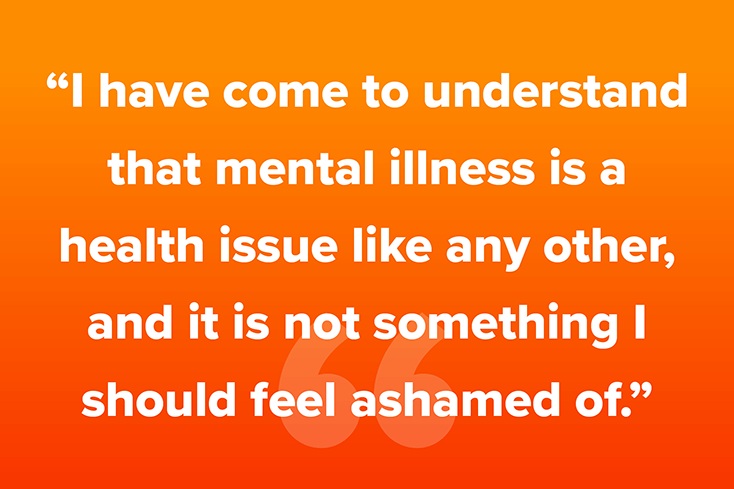March 24, 2022
By Brandt Schubbe

In 2008, I struggled immensely with suicidal ideation. At the peak of a mental health episode, I was diagnosed with bipolar and schizoaffective disorder. Before I was diagnosed, I didn’t know what was happening to me. I was sleepless, restless and anxious. I couldn’t trust my family, friends or even myself. This state of confusion was scary, and I broke down to my mother. After I confessed the challenges I’d been facing, I was hospitalized.
When I first received my diagnoses, I felt guilty and ashamed. I felt as though I did something wrong. I didn’t even feel worthy of being a part of the human race. I was also not responsive to treatment in the hospital. Doctors prescribed medications, but I continued to struggle. I was able to get my bearings after some time, but I was often preoccupied by my fear that I would never leave the hospital. My treatment team gave me pamphlets about my mental health conditions, but I wasn’t able to read them, as my mind was constantly racing, and I was angry at the world for being hospitalized. I was struggling — but the worst part was that my family was confused and scared.
Over the years, I have been in and out of hospitals in Minnesota — but I’ve also found periods of happiness and stability. The fear of being locked away forever has never fully disappeared, but I have come to understand my illness — it is a health issue like any other, and it is not something I should feel ashamed of.
Things really changed once I heard about NAMI. I read about stories of people like me who were overcoming struggles beyond their control. I even decided to get involved myself. In 2012, I attended a training to chair a NAMI Connections Group in Minneapolis. Even though I was a facilitator, my participants taught me how to open up, and I no longer felt like a “loner.” For the first time, I was part of a group of people who could teach each other how to cope with our challenges. I facilitated the group for a year, and my symptoms abated for about five years.
Then, in 2018, I had another episode after my grandfather died. I was overworked and sad, so things began to fall apart. I awoke in the hospital with paint on my face and clothes. I had foggy memories of police officers questioning me, but I only remembered making an attempt on my life, which landed me back in the hospital in St. Paul. I wish I could say that was my last visit, but my struggles continued.
One night, after being up for a few days, I called my Assertive Community Treatment (ACT) team and told them I was suicidal. They guided me to a crisis center, where I was able to get some rest and resume my recovery. As I recovered, I came to realize that healing and finding appropriate resources while in a treatment center can be an isolating experience. Because of this, I wanted to share my story to help others who may be feeling that loneliness.
Ultimately, I’ve learned that while I live with mental illness, my life does not need to be defined by mental illness. Moving forward, I will do my best to continue educating others.
Submit To The NAMI Blog
We’re always accepting submissions to the NAMI Blog! We feature the latest research, stories of recovery, ways to end stigma and strategies for living well with mental illness. Most importantly: We feature your voices.
LEARN MORE